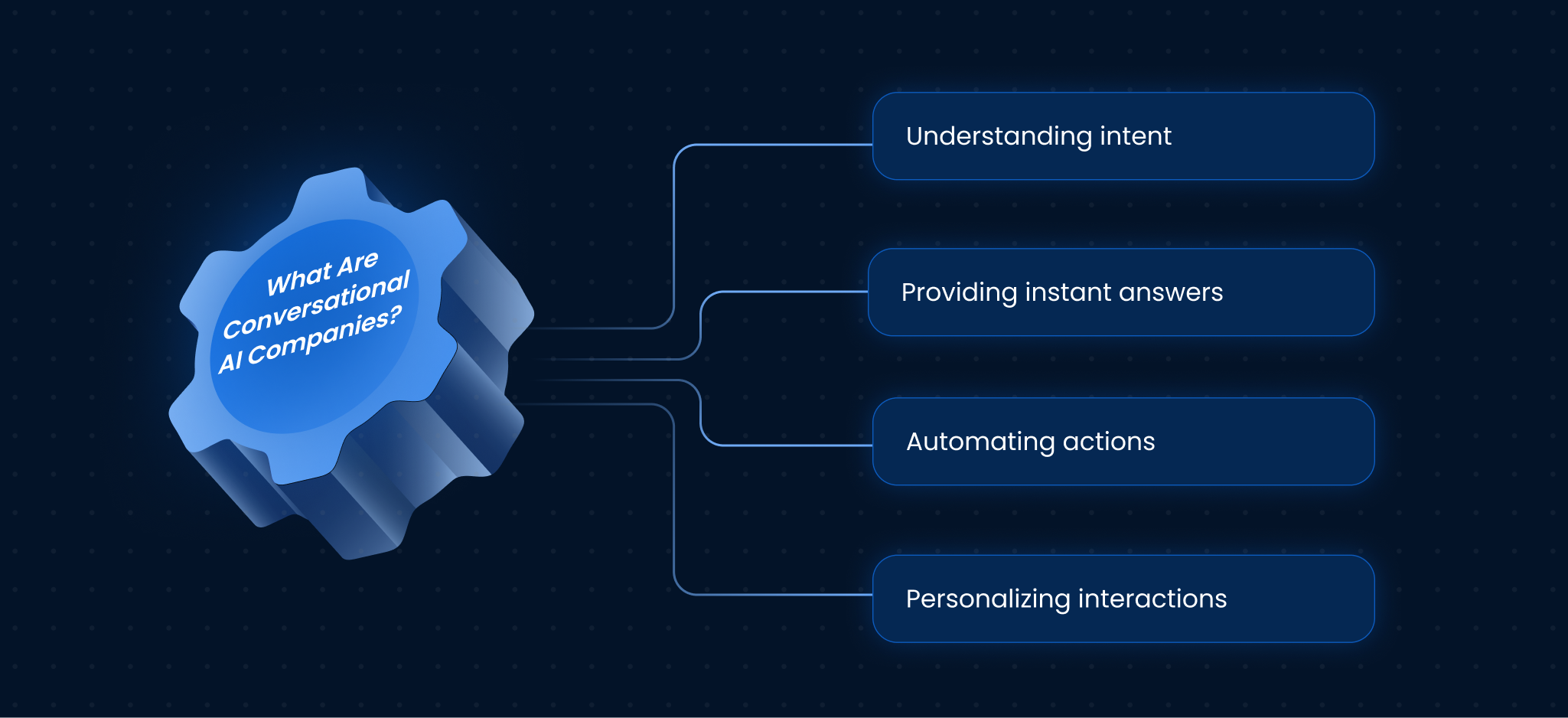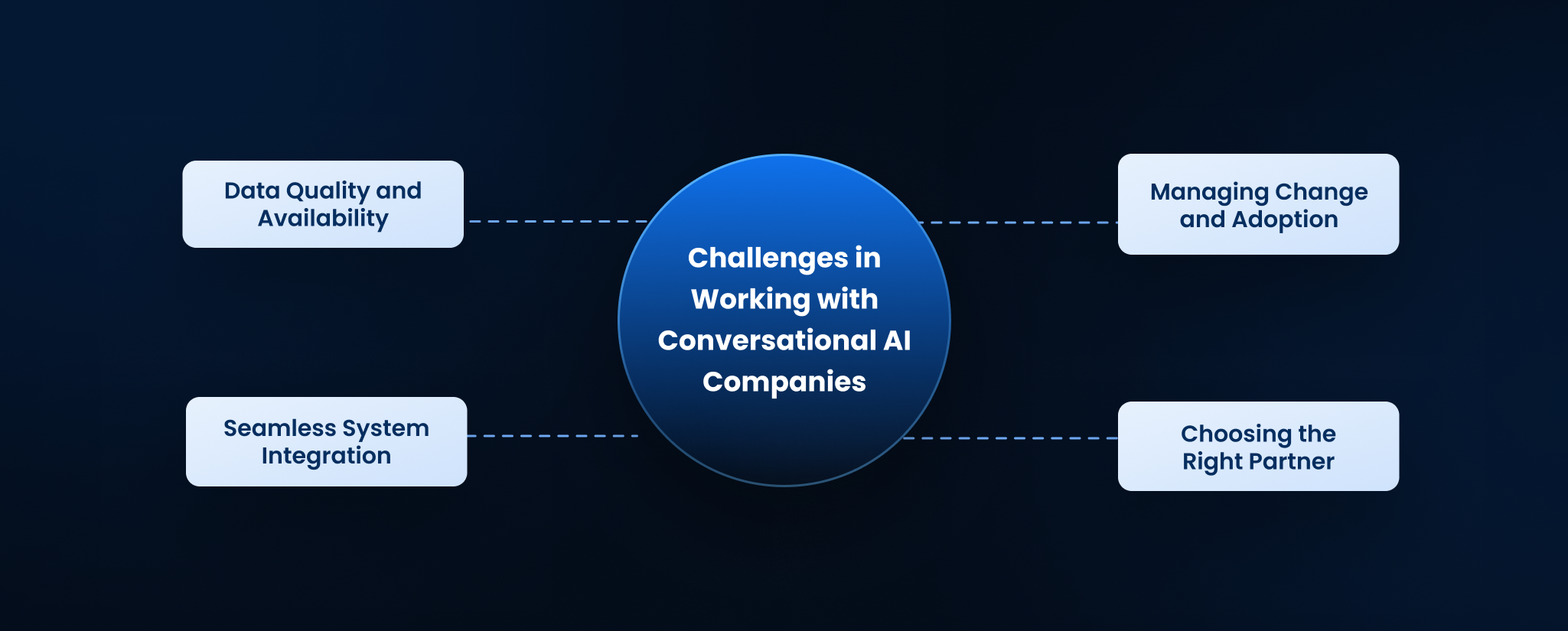Introduction
For technology leaders in large US companies, the landscape of enterprise support is undergoing a seismic shift. We are moving beyond the era of static forms and endlessly ringing phones, transitioning into a new paradigm powered by intelligent automation. At the heart of this transformation are Conversational AI companies, pioneering solutions that are fundamentally changing how employees interact with IT, HR, and Finance departments. In 2025, these advanced platforms are not just about answering questions; they’re about proactively resolving issues, streamlining operations, and freeing up your valuable teams to focus on strategic initiatives.
Imagine a world where your employees get instant, personalized support for their everyday work issues, regardless of the time or day. This isn’t a futuristic dream; it’s the present reality being built by leading Conversational AI companies. This guide will explore what these companies offer, how they operate, and why their solutions are becoming indispensable for competitive enterprises.
What Are Conversational AI Companies?
At its core, a conversational AI company develops software that allows computers to understand, process, and respond to human language in a natural, human-like way. Think of it as teaching computers to talk, but with a purpose. Unlike traditional chatbots that follow rigid scripts, today’s conversational AI leverages advanced technologies like large language models and natural language understanding to interpret complex requests, grasp context, and even learn from interactions. Therefore, these companies are building the intelligent interfaces that power automated service desks across various departments.
In essence, these companies craft sophisticated digital agents capable of:
- Understanding intent: They can figure out what an employee truly needs, even if the request is phrased informally or unclearly.
- Providing instant answers: From “How do I reset my password?” to “What’s the company’s vacation policy?”, employees get immediate, accurate responses.
- Automating actions: Beyond just answering, the best systems can perform tasks directly, like processing an expense report or unlocking a user account.
- Personalizing interactions: They remember past conversations and employee profiles to offer tailored assistance.
This evolution from simple question-and-answer bots to truly intelligent assistants marks a significant leap forward, offering unparalleled efficiency and employee satisfaction.

How Conversational AI Companies Operate
The operational model of modern Conversational AI companies is built on a blend of cutting-edge technology and deep understanding of enterprise needs. They typically offer robust platforms designed to integrate seamlessly into existing IT infrastructure, rather than requiring a complete overhaul. This makes adoption smoother for large organizations.
Here’s a closer look at their operational framework:
- Data Ingestion and Knowledge Building: These companies start by ingesting vast amounts of your enterprise’s internal data , knowledge bases, historical tickets, policy documents, and frequently asked questions. They then use sophisticated machine learning algorithms to process this information, creating a comprehensive digital brain for the AI.
- Natural Language Processing and Understanding (NLP & NLU): This is where the magic happens. When an employee types or speaks a request, the AI uses NLP to break down the language and NLU to understand its meaning and intent. Consequently, it can differentiate between “I need a new laptop” and “My laptop is broken.”
- Integration with Enterprise Systems: A key strength of leading Conversational AI companies is their ability to connect with your core business applications. This includes systems like ServiceNow for IT, Workday for HR, and SAP for Finance. These integrations allow the AI to not just provide information but also to execute tasks within those systems, truly automating workflows.
- Continuous Learning and Improvement: These platforms are designed to learn and improve over time. Each interaction, whether successful or requiring human intervention, provides valuable data that helps refine the AI’s understanding and response accuracy. This iterative process ensures the AI gets smarter with every query.
Key Benefits of Partnering with Conversational AI Companies
For technology leaders, the decision to invest in advanced AI isn’t just about buzzwords; it’s about clear, measurable benefits that impact the bottom line and employee experience. Partnering with the right Conversational AI companies offers compelling advantages:
-
Instant Resolution, 24/7: Employees no longer wait for business hours or queue times. They get immediate answers and resolutions for common issues around the clock. This significantly boosts productivity and reduces frustration.
-
Reduced Operational Costs: By automating routine inquiries and tasks, your IT, HR, and Finance teams spend less time on repetitive work. This translates directly into cost savings by reducing the volume of tickets handled by human agents.
-
Enhanced Employee Experience: A seamless and efficient support experience makes employees feel valued and empowered. They can focus on their core work rather than navigating bureaucratic hurdles, leading to higher satisfaction and engagement.
-
Increased Agent Productivity: When the AI handles the simple stuff, your human experts are freed up to tackle complex, high-value problems that truly require their expertise. This not only makes their jobs more engaging but also allows them to address critical issues faster.
-
Data-Driven Insights: Conversational AI platforms collect valuable data on employee needs, common issues, and service gaps. This data provides actionable insights that can inform process improvements, knowledge base enhancements, and strategic planning.
Top Use Cases of Conversational AI in Enterprises
The versatility of conversational AI means it can be applied across numerous functions within a large enterprise. The most impactful use cases tend to be in areas with high volumes of repetitive inquiries, like IT, HR, and Finance.
IT Support Automation
This is often the first stop for Conversational AI companies in enterprises due to the sheer volume of help desk tickets.
- Password Resets: The classic and most frequent request, instantly handled.
- Software Access & Troubleshooting: Granting access to applications, guiding users through basic troubleshooting steps, or escalating to the right human agent with full context.
- Hardware Requests: Initiating requests for new equipment or repairs.
- System Status Updates: Providing real-time information on outages or scheduled maintenance.
HR Support Automation
Conversational AI can transform the employee experience within Human Resources.
- Policy Inquiries: Answering questions about benefits, vacation time, sick leave, or company policies.
- Onboarding & Offboarding: Guiding new hires through paperwork, setting up accounts, or managing exit procedures.
- Payroll & Benefits Questions: Providing information on pay stubs, health insurance, or retirement plans.
- Leave Requests: Helping employees submit and track various types of leave.
Finance Support Automation
Finance departments also benefit greatly from intelligent automation.
- Expense Report Assistance: Guiding employees through the expense submission process or answering questions about company policies.
- Invoice Status Inquiries: Providing updates on payment statuses for vendors or internal requests.
- Budget & Policy Questions: Answering questions related to departmental budgets or purchasing policies.
- Travel Reimbursement: Helping employees understand and submit travel-related expenses.
Challenges in Working with Conversational AI Companies
While the benefits are clear, it’s also important for technology leaders to be aware of potential challenges when integrating solutions from Conversational AI companies. Being prepared for these can help ensure a smoother deployment.
- Integration Complexity: Large enterprises often have intricate, legacy systems. Integrating new AI platforms requires careful planning and robust connectors to ensure seamless data flow and functionality.
- Data Quality and Availability: The effectiveness of conversational AI heavily relies on the quality and completeness of your existing knowledge base and historical data. Inaccurate or fragmented data can lead to poor AI performance.
- Change Management: Employees and support teams need to adapt to new ways of working. Proper training, clear communication, and demonstrating the value of the AI are crucial for successful adoption.
- Ongoing Maintenance and Training: While AI learns, it’s not a “set it and forget it” solution. It requires ongoing monitoring, training, and refinement to maintain accuracy and expand its capabilities.
- Scalability Concerns: Ensure the chosen platform from among the various Conversational AI companies can scale with your organization’s growth and increasing demands without performance degradation.

Leading Conversational AI Companies in 2025
The market for conversational AI is dynamic, with many innovative Conversational AI companies vying for enterprise attention. In 2025, leaders are distinguished by their ability to deliver not just technology, but complete, scalable, and secure solutions. When evaluating potential partners, consider their track record with large enterprises, their integration capabilities, their approach to security and data privacy, and their commitment to continuous innovation. The focus should be on partners who understand the nuances of your business and can tailor their solutions accordingly.
Some of the prominent players continue to evolve, while new innovators are emerging, pushing the boundaries of what’s possible with agentic AI and generative models. Their offerings vary, so careful assessment against your specific needs is paramount.
Leena AI: An Enterprise Conversational AI Solution
At Leena AI, we’re keenly aware of the unique challenges faced by large US enterprises. We’re not just another one of the many Conversational AI companies; we’re pioneering agentic AI that goes beyond simple automation. Our platform is specifically designed to provide intelligent, autonomous resolution for IT, HR, and Finance tickets, ensuring your employees get the support they need instantly and efficiently.
Agentic AI in IT: Beyond the Chatbot
Leena AI stands apart with its focus on “Agentic AI” , this means our AI agents don’t just answer questions; they act. For IT support, this translates into real-world value:
-
Autonomous Issue Resolution: Our AI can detect, diagnose, and often resolve IT issues without human intervention. Imagine an employee’s Wi-Fi acting up , our agent can not only troubleshoot but also apply fixes, all through a natural conversation.
-
Proactive Problem Solving: Leveraging integrations with your monitoring tools, our AI can identify potential issues (like a critical application slowing down) and proactively engage affected employees to either resolve the problem or gather necessary information before a ticket is even formally created.
-
Complex Workflow Orchestration: Beyond simple tasks, our agents can navigate multi-step workflows across various IT systems , provisioning new software, escalating to the right team with all context pre-filled, or managing hardware requests end-to-end.
-
Seamless Human Handoff: When human expertise is needed, our AI ensures a smooth transition. It provides your human agents with a comprehensive summary of the conversation, the steps already taken, and relevant employee data, allowing for quicker resolution and a better experience.
Leena AI creates value for enterprises by transforming the employee support experience. We help companies drastically reduce ticket volumes, improve resolution times, enhance employee satisfaction, and free up valuable team members to focus on strategic, impactful work. We pride ourselves on our robust integrations, enterprise-grade security, and a relentless focus on delivering measurable return on investment.
Future Trends in Conversational AI Companies
The journey of Conversational AI companies is far from over. The future promises even more sophisticated, human-centric, and proactive solutions. Technology leaders should keep an eye on these emerging trends:
- Hyper-Personalization: AI will become even more adept at understanding individual employee needs, preferences, and work styles, offering truly tailored support.
- Proactive and Predictive AI: Expect AI to move further into anticipating problems before they arise, initiating solutions or informing users proactively.
- Multimodal Interactions: Beyond text, AI will increasingly integrate voice, video, and even augmented reality for a richer, more intuitive support experience.
- Ethical AI and Trust: As AI becomes more integrated, there will be an even greater focus on explainable AI, transparency, and robust ethical frameworks to ensure trust and fairness.
- Autonomous Agent Networks: We might see specialized AI agents collaborating to solve complex issues, much like a team of human experts.
The landscape of enterprise support is evolving rapidly. By staying informed about the advancements offered by Conversational AI companies, particularly those pioneering agentic AI, technology leaders can ensure their organizations remain efficient, agile, and poised for future success.
Frequently Asked Questions about Conversational AI Companies
1. What exactly do Conversational AI companies provide beyond basic chatbots?
Conversational AI companies today offer sophisticated platforms leveraging large language models and natural language understanding. These go beyond simple scripted responses to understand complex intent, automate multi-step actions across enterprise systems, and proactively resolve issues, essentially acting as intelligent digital agents for IT, HR, and Finance.
2. How do Conversational AI companies ensure data security for large enterprises?
Leading Conversational AI companies prioritize enterprise-grade security. They offer features like on-premise or private cloud deployment options, robust access controls, encryption, and compliance with industry standards like SOC 2 and HIPAA. It’s crucial to inquire about their specific data governance policies and fine-tuning practices.
3. What's the typical return on investment (ROI) when partnering with Conversational AI companies?
While ROI varies, large enterprises often see significant returns within 12-24 months. This includes reductions in ticket volume (e.g., 30-50% for common queries), faster resolution times, and considerable cost savings due to increased human agent productivity and reduced operational overhead.
4. Can Conversational AI companies integrate with our existing legacy systems?
Yes, reputable Conversational AI companies specialize in robust integrations. They provide connectors and APIs to integrate with a wide array of enterprise resource planning, human capital management, and IT service management systems, ensuring seamless data flow and automated task execution.
5. What kind of internal team is needed to manage a solution from a Conversational AI company?
While the AI automates much of the work, a small internal team is beneficial. This typically includes a conversational designer, an AI trainer or content manager to refine responses and train the AI on new data, and a system administrator to manage integrations and performance.
6. What differentiates agentic AI from traditional conversational AI offered by some companies?
Agentic AI, as offered by advanced Conversational AI companies like Leena AI, focuses on the AI’s ability to not just understand and respond, but to act autonomously. This means it can perform complex, multi-step tasks like troubleshooting and applying fixes, or orchestrating workflows across different enterprise systems, rather than just providing information.













